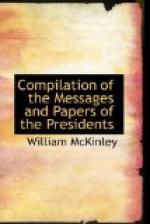The first encounter of the war in point of date took place April 27, when a detachment of the blockading squadron made a reconnoissance in force at Matanzas, shelled the harbor forts, and demolished several new works in construction.
The next engagement was destined to mark a memorable epoch in maritime warfare. The Pacific fleet, under Commodore George Dewey, had lain for some weeks at Hongkong. Upon the colonial proclamation of neutrality being issued and the customary twenty-four hours’ notice being given, it repaired to Mirs Bay, near Hongkong, whence it proceeded to the Philippine Islands under telegraphed orders to capture or destroy the formidable Spanish fleet then assembled at Manila. At daybreak on the 1st of May the American force entered Manila Bay, and after a few hours’ engagement effected the total destruction of the Spanish fleet, consisting of ten war ships and a transport, besides capturing the naval station and forts at Cavite, thus annihilating the Spanish naval power in the Pacific Ocean and completely controlling the bay of Manila, with the ability to take the city at will. Not a life was lost on our ships, the wounded only numbering seven, while not a vessel was materially injured. For this gallant achievement the Congress, upon my recommendation, fitly bestowed upon the actors preferment and substantial reward.
The effect of this remarkable victory upon the spirit of our people and upon the fortunes of the war was instant. A prestige of invincibility thereby attached to our arms which continued throughout the struggle. Reenforcements were hurried to Manila under the command of Major-General Merritt and firmly established within sight of the capital, which lay helpless before our guns.
On the 7th day of May the Government was advised officially of the victory at Manila, and at once inquired of the commander of our fleet what troops would be required. The information was received on the 15th day of May, and the first army expedition sailed May 25 and arrived off Manila June 30. Other expeditions soon followed, the total force consisting of 641 officers and 15,058 enlisted men.
Only reluctance to cause needless loss of life and property prevented the early storming and capture of the city, and therewith the absolute military occupancy of the whole group. The insurgents meanwhile had resumed the active hostilities suspended by the uncompleted truce of December, 1897. Their forces invested Manila from the northern and eastern sides, but were constrained by Admiral Dewey and General Merritt from attempting an assault. It was fitting that whatever was to be done in the way of decisive operations in that quarter should be accomplished by the strong arm of the United States alone. Obeying the stern precept of war which enjoins the overcoming of the adversary and the extinction of his power wherever assailable as the speedy and sure means to win a peace, divided victory was not permissible, for no partition of the rights and responsibilities attending the enforcement of a just and advantageous peace could be thought of.




